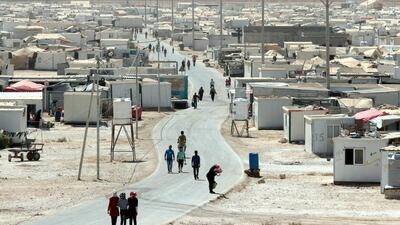"In the next five years, we fear things will only get worse for our children’s lives and futures.” This sentiment, expressed by a community leader from the northern Irbid governorate, was echoed by many at a discussion this year in Jordan. With so many more students competing for university places, would fewer Jordanian students be admitted to good courses? What would this mean for their ability to find jobs in an environment where youth unemployment is already so high?
Border towns in Syria’s neighbours, where refugees have concentrated, have experienced significant negative impacts since the start of the war. Many of these communities used to make their livings from cross-border trade, which has been greatly reduced. Rent and other prices have shot up, while wages have gone down because of the increased availability of cheap labour. Schools are overcrowded and crumbling. The rapid expansion of towns has meant that waste now regularly goes uncollected on unpaved, unlit streets.
Legitimate concerns such as these are forming political barriers to forward-thinking policies that would improve the lives of both refugees and locals in these underdeveloped areas.
As I point out in a new Chatham House research paper, most Syrians who are old enough want to work, but getting a permit is nearly impossible. Many are informally employed out of necessity, but they are at constant risk of fines, arrest or even deportation if they are caught. Opening up more opportunities for Syrian refugees in Jordan would fill labour needs in the low-skill agriculture, manufacturing and construction sectors. It could also reduce the need for donor aid for refugees, which could free up funds for local development. But Jordanian public opinion is generally against making it easier for Syrians to work. There are widespread local concerns about increased competition for jobs, and some see work permits as a step towards permanent citizenship for refugees.
Addressing these concerns will require political leadership, but also a different approach to governance. Local authorities and municipalities are on the front line for dealing with refugees, over 80 per cent of whom live in urban areas alongside local communities rather than in camps. It is they who are in charge of maintaining the towns and villages where refugees have settled, and they are usually the ones held responsible – rightly or wrongly – for improving local economies and managing community tensions. Local authorities need more resources to meet their constituencies’ escalating needs – but they also need more autonomy from central governments so they can run services and projects more efficiently.
Recently announced local development initiatives in the border governorates of Irbid and Mafraq are a step in the right direction, though it remains to be seen whether they will result in concrete, sufficient changes. Local frustrations with the perceived inaction of the government and international community are already on the rise and, if not addressed, could boil over into serious social unrest.
This is not the first time Jordan has been impacted by regional displacement, but circumstances are now different. There are significantly more refugees from Syria than previously came from Iraq. The domestic and regional contexts were very different when Jordan took in millions of Palestinian refugees in the 1940s and 1960s. Economic grievances could also contribute to the refugee crisis having a destabilising effect in the country, as the regional environment has not been beneficial to trade and tourism, especially in the last few years.
Four years into the war in Syria, people living in the neighbouring countries are aware of the need to focus on sustainable solutions for a crisis that does not look like it will end anytime soon. While many would like the refugees to be able to return to Syria sooner rather than later, an increasing number of Jordanians, Lebanese and Turks acknowledge that it will probably be over a decade before the majority return home. They know that most refugees cannot afford the expensive passage to Europe and only a tiny minority will be accepted for resettlement in other countries, even in the best case scenario. Some believe the refugees will never go back to Syria because they will have settled into their new lives. Whichever is the case, it is clear that serious reforms, alongside donor support, will be needed to help manage the impact. In the short term, political costs will have to be borne for the sake of longer-term payoffs.
Doris Carrion is a research associate in the Middle East and North Africa programme at Chatham House in London

